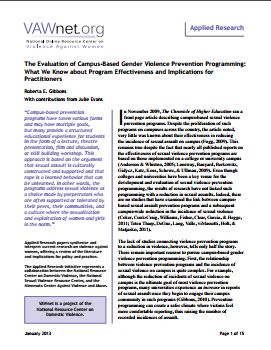Resources Library: Publications/Reports
Start a Search:
Ensuring Access to Services for Survivors with Limited English Proficiency: Frequently Asked Questions
Originally posted on VAWnet and created by Casa de Esperanza, this resource is a compilation of the answers to frequently asked questions regarding Title VI of the Civil Rights Act, which requires all programs that receive federal funds to take reasonable steps to ensure meaningful access to individuals with Limited English Proficiency. Ensuring meaningful access to services is critical to protecting the life and safety of survivors with limited English proficiency (LEP). This document explains the requirements, provides examples for implementation, and provides links to numerous additional resources.
Evaluation of Campus Based Gender Violence Prevention Programming from VAWnet

Colleges and universities have been a key venue for the development and evaluation of sexual violence prevention programming. However, there are no studies demonstrating a link between campus-based sexual assault prevention programs and a subsequent campus-wide reduction in the incidence of sexual violence (Coker, Cook-Craig, Williams, Fisher, Clear, Garcia, & Hegge, 2011; Teten Tharp, DeGue, Lang, Valle, Massetti, Holt, & Matjasko, 2011).
Nevertheless, there remain important reasons to pursue campus-based gender violence prevention programming:
- Prevention programming can create a safer climate where victims feel more comfortable reporting, actually raising the number of recorded incidences of assault.
- Using a decrease in the incidence of sexual assault as the only measure of success for prevention programs ignores many other short- and intermediate-term goals that are conceptually linked to a reduction in sexual assault, such as increasing students knowledge about rape and changing attitudes related to rape so that students are less likely to blame victims (Anderson & Whiston, 2005; Lonsway, Banyard, Berkowitz, Gidycz, Katz, Koss, Schewe, & Ullman, 2009).
- Research shows that a significant number of woman experience sexual violence while in college (Fisher, Cullen, & Turner, 2000; Koss, Gidycz, & Wisniewski, 1987; Krebs, Lindquist, Warner, Fisher, & Martin, 2007; Black et. al., 2011).
Exploring the Implications of Virginia’s Sexual Assault Response Team (SART) Code Mandate
In 2009, the Code of Virginia was amended to mandate local sexual response teams (SARTs). As part of a national initiative to explore the impact of mandates on the formation, performance, and efficacy of SARTs, in 2016 the Virginia Department of Criminal Justice Services (DCJS) partnered with the Sexual Violence Justice Institute (SVJI) to explore the mandate’s implications and gain insight into what SART ecosystems need to become strong and effective. The results of the project were documented in a report titled Cultivating SART Efficacy: Insights on the Impact of the Virginia Sexual Assault Response Team Mandate. The report highlights the ripple effects of the mandate’s passing, lingering questions, and insights and ideas for resources to support SART growth, strength, and sustained success.
TO VIEW THE RECORDED WEBINAR, CLICK HERE. (You will be required to "register" before viewing the recording)
Topics addressed:
· Impact of the mandate on the growth of Virginia SARTs
· Impact of the mandate on SART efficacy
· Challenges of mandate implementation
· Other notable events that occurred as a result of the mandate
· 7 Elements of a healthy SART Ecosystem
· Considerations and resources for enhancing SARTs
For More Information, Contact:
Jennifer Kline
(804) 225-3456
Kristina Vadas
(804) 786-7802
Exposing Reproductive Coercion: A Toolkit for Awareness-Raising, Assessment, and Intervenetion
The Feminist Women’s Health Center, The National Coalition Against Domestic Violence, and the National Organization for Men Against Sexism partnered together to create this toolkit in an effort to bridge the gap between the fields of reproductive health and domestic violence. This toolkit provides credible, unbiased information for women and individuals working in the domestic violence and reproductive health communities. It is designed to empower women to take control of their own reproductive health, and to help domestic violence and healthcare workers recognize the intersections between their fields and respond with practical solutions.
Facing The Facts: Impact of Exposure to Intimate Partner Violence on Children in the Home
This Issue Brief provides an overview of research findings about the impact of intimate partner violence on children in the home. Information is presented to help advocates, professionals,
researchers and community members identify and address the needs of these children. However, understanding the impact of intimate partner violence is just the first step. Once a child has been
asked to share his or her experience, it becomes a matter of necessity to have a strategy in place to help that child.

